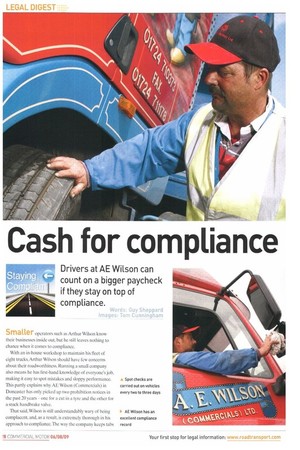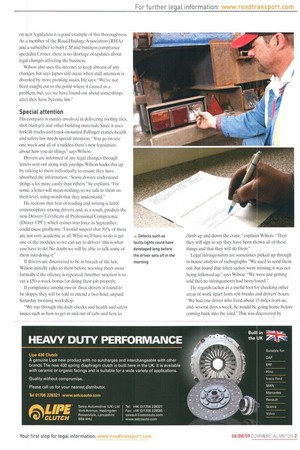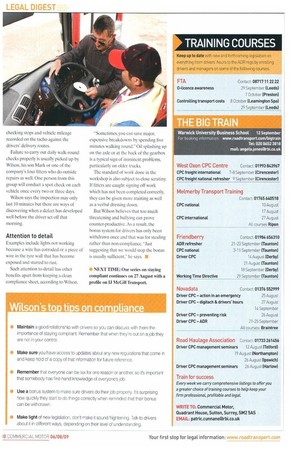Cash for compliance
Page 28

Page 29

Page 30

If you've noticed an error in this article please click here to report it so we can fix it.
Drivers at AE Wilson can count on a bigger paycheck if they stay on top of
compliance. Words: Guy Sheppard images: Tom Cunningham Smatter operators such as Arthur Wilson know their businesses inside out, but he still leaves nothing to chance when it comes to compliance.
With an in-house workshop to maintain his fleet of eight trucks, Arthur Wilson should have few concerns about their roadworthiness. Running a small company also means he has first-hand knowledge of everyone's job,
making it easy to spot mistakes and sloppy performance. Spot checks are This partly explains why AE Wilson (Commercials) in carried out on vehicles Doncaster has only picked up two prohibition notices in every two to three days
the past 20 years — one for a cut in a tyre and the other for a stuck handbrake valve.
That said, Wilson is still understandably wary of being AE Wilson has an complacent. and, as a result, is extremely thorough in his excellent compliance approach to compliance. The way the company keeps tabs record
on new legislation is a good example of this thoroughness. As a member of the Road Haulage Association (RHA) and a subscriber to both CM and business compliance specialist Croner, there is no shortage of updates about legal changes affecting the business.
Wilson also uses the internet to keep abreast of any changes, but says lapses still occur when staff attention is diverted by more pressing issues. He says: "We've not been caught out to the point where it caused us a problem, but, yes, we have found out about some things after they have become law."
Special attention
His company is mainly involved in delivering roofing tiles, shot blast grit and other building materials. Since it uses forklift trucks and truck-mounted Palfinger cranes, health and safety law needs special attention. "You go on-site one week and all of a sudden there's new legislation about how you do things," says Wilson.
Drivers are informed of any legal changes through letters sent out along with payslips. Wilson backs this up by talking to them individually to ensure they have absorbed the information. "Some drivers understand things a lot more easily than others," he explains -For some, a letter will mean nothing, so we talk to them on their level, using words that they understand."
He reckons that fear of reading and writing is fairly conimonplace among drivers, and, as a result, predicts the new Drivers' Certificate of Professional Competence (Driver CPC), which conies into force in September. could cause problems. -I would suspect that 50% of them are not very academic at all. What we'll have to do is get one of the modules so we can say to drivers this is what you have to do: No doubt we will be able to talk some of them into doing it."
If drivers are discovered to be in breach of the law, Wilson initially talks to them before warning them more formally if the offence is repeated. Another sanction is to cut a1:50-a-week bonus for doing their job properly.
If compliance among two or three drivers is found to be sloppy they will be told to attend a two-hour, unpaid Saturday morning workshop.
"We run through the daily checks and health and safety issues such as how to get in and out of cabs and how to climb up and down the crane," explains Wilson. "Then they will sign to say they have been shown all of these things and that they will do them."
Legal infringements are sometimes picked up through in-house analysis of tachographs "We used to send them out, but found that when tachos went missing, it was not being followed up,' says Wilson. "We were just getting told that no infringements had been found."
He regards tachos as a useful tool for checking other areas of work apart from rest breaks and drivers' hours "We had one driver who lived about 15 miles from us. and, several days a week, he would be going home before corning back into the yard." This was discovered by checking stops and vehicle mileage recorded on the tacho against the drivers' delivery routes.
Failure to carry out daily walk-round checks properly is usually picked up by Wilson, his son Mark or one of the company's four fitters who do outside repairs as well. One person from this group will conduct a spot check on each vehicle once every two or three days.
Wilson says the inspection may only last 10 minutes but there are ways of discovering when a defect has developed well before the driver set off that morning.
Attention to detail Examples include lights not working because a wire has corroded or a piece of wire in the tyre wall that has become exposed and started to rust.
Such attention to detail has other benefits apart from keeping a clean compliance sheet, according to Wilson. "Sometimes, you can save major, expensive breakdowns by spending five minutes walking round." Oil splashing up on the axle or at the back of the gearbox is a typical sign of imminent problems, particularly on older trucks The standard of work done in the workshop is also subject to close scrutiny. If fitters are caught signing off work which has not been completed correctly, they can be given more training as well as a verbal dressing down.
But Wilson believes that too much threatening and bullying can prove counter-productive. As a result, the bonus system for drivers has only been withdrawn once and that was for stealing rather than non-compliance. "Just suggesting that we would stop the bonti,, is usually sufficient," he says. IS




































































































































